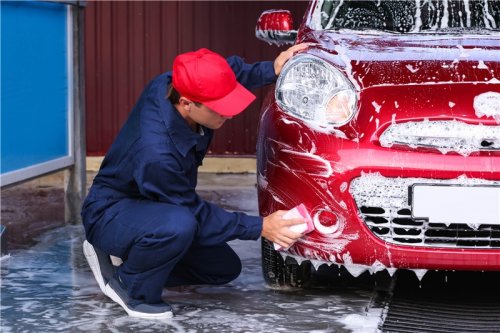Xihan’er Car Wash: Dream Home for the Mentally Challenged

By CEIBS Associate Professor of Management Daniel Han Ming Chng, Associate Professor of Strategy Peter Moran, Research Assistant Sun Heming & Case Researcher Zhao Liman
Xihan’er, a Taiwanese term of endearment for the mentally challenged which translates to “happy, innocent children”, refers to a group of people who find it difficult to survive in everyday society.
It includes those who suffer from slowed mental growth as a result of cerebral palsy, autism, Down’s Syndrome, etc. They can’t work independently without the supervision of a normal adult, and their parents are most worried about their future.
Since 2014, Cao Jun, who has a child facing these challenges, has been trying to provide employment for this special group by creating the “Xihan’er dream home”.
In 2015, Cao Jun and nine other “Xihan’er parents” founded Shenzhen Xihan’er Car Wash. Over the past three years, the car wash has earned wide public acclaim and served as a good example of providing employment for the mentally challenged. An even more exciting aspect is that after some training, the Xihan’er employees show great improvement in communication and physical coordination.
A parent’s wish
Cao Jun’s son was diagnosed with slowed mental growth when he was seven months old; at the age of seven he began studying in a special school.
In China, the mentally challenged are entitled to special education that corresponds to their level of disability. However, few of them can hope to get a job afterwards. According to the Second National Census of Disabled People, less than 10% of the over 12 million mentally challenged people in China are actively employed. As a Xihan’er parent, Cao Jun kept thinking: Who will take care of my son when my wife and I pass away?
“I thought about it for more than 10 years but couldn’t come up with a solution even after my son reached 15 years old,” said Cao Jun, “so I figured I had to find a way out.” He did research on Xihan’er employees in factories and found that they were usually unable to keep their jobs for long. This was because, being somewhat awkward in their movement, they had difficulty doing simple tasks such as folding cardboard boxes. Also, being hard-pressed to focus their attention for extended durations, they must rest often while at work.
Cao Jun’s thoughts and explorations were focused on finding a means of livelihood that is both suitable for the Xihan’er and sustainable for the employer.
Dream home
Intent on building a “Xihan’er dream home”, Cao Jun searched all over the country for feasible projects. The first stop on his inspection tour was the Star Farm in Fujian, founded by a group of autistic kids’ moms. Then he went to Shanghai, Hong Kong and Japan. Eventually he made an amazing discovery in Taiwan.
The Taiwan Social Welfare Foundation for Xihan’er, founded in 1995, had established over 40 service centres where nearly 600 mentally challenged people provide regular services every year. Since 2006, the foundation had worked on establishing Swan City, a lifetime healthcare centre for the mentally challenged, funded partially by the profits of enterprises with Xihan’er employees, and partially through donations. The mentally challenged people living in Swan City are well taken care of and trained in basic life skills, so that they can have satisfactory lives there.
Cao Jun thought: “Since this business model has proved successful in Taiwan, can it be duplicated in the Chinese mainland for the development of the Xihan’er there?”
For his dream to become reality, an enterprise had to be put in place so that its profits could support the Xihan’er dream home which requires a large amount of resources. Moreover, the enterprise must be organised as a trust fund and placed under transparent monitoring. In addition, there were other issues to address; for example the property of deceased parents of Xihan’er employees would be handed over to the enterprise, which would continue to provide financial support to the Xihan’er employees.
Cao Jun decided to create a car wash company as part of a larger enterprise that would eventually expand into a lot of fields such as horticulture, agricultural produce and recycling.
A profitable company, not charity
The first of its kind in Shenzhen, Xihan’er Car Wash was inaugurated on August 8, 2015 by Cao Jun and nine other Xihan’er parents. The company’s goal is to transform Xihan’er employees into providers of social services, instead of mere consumers of social resources. The company is not only a place where cars are washed, but also a rest space, where Xihan’er can access learning and training programmes as well as rehabilitation.
Cao Jun decided to make the car wash a social company instead of a charity or a non-profit enterprise. Car wash services are charged at regular rates: RMB35 for a single vehicle. Anything more than the regular fee, no matter how kind-hearted the customer, is politely declined.
“People are equal, and we don’t need donations from our customers,” he explained. “We are supposed to make money through providing good service, not with moral hijacking.”
The car wash company is managed as a business. Three mechanics are in charge of providing support, training and supervision of daily tasks, two special education teachers provide programmes in rehabilitation and study, and one full-time staff manages routine operations. The company has 16 mentally challenged people on staff, including two with Class III mental disabilities, 12 with Class II mental disabilities, and 2 with Class I mental disabilities. On average, the company washes 40 – 50 vehicles every day, with a daily peak of 74 vehicles.
Life of washing cars
Although customers are not too picky, Xihan’er employees have to make a lot of effort to reach the general level of the car wash market. At Xihan’er Car Wash, a vehicle is washed in 20 – 30 minutes, on par with the market average. In order to maintain the company’s competitive edge, Cao Jun has carefully designed the operational details.
Testing: In order to divide labour among the Xihan’er employees with different levels of mental disabilities, Cao Jun and his team have developed a testing and training module, with which the special education teachers can make a quantitative evaluation of each Xihan’er employee and assess his car washing skills.
Training: In order to provide satisfactory service to customers, mechanics and teachers engage each Xihan’er employee in custom-made training programmes.
Team setup: Xihan’er employees are distributed into different teams, so that each team comprises different levels of mental disabilities. The mechanics divide the car-washing process into a dozen steps, each of which is assigned to a Xihan’er employee according to his ability.
Rehabilitation: The two special education teachers help Xihan’er employees to rehabilitate themselves after work. They can engage in programmes such as reading, understanding, cognition, writing, intellectual games, and physical exercise.
Wages: Xihan’er employees are paid the same as normal workers. They may have different jobs, but they are paid the same, as everyone does his best.
In the first six months after the founding of the car wash company, teachers would take Xihan’er employees to dinner in a nearby canteen frequented by taxi drivers. At first, they didn’t know anything about queuing, but they later learned about forming a line and waiting in an orderly manner.
In order to facilitate the social integration of Xihan’er employees, the car wash company does not offer residence but requires them to get to work by themselves. At first, some Xihan’er employees had to be picked up and taken to work by an assigned car, but after some training they can all make their own transportation arrangements now.
Having gained confidence through work, Xihan’er employees are more eager to communicate with others than before. At first they had all kinds of tantrums, but after a great deal of training they have shown great improvement in that respect. Now they greet customers and even remember and chat with old punters.
Far-reaching influence
In January 2016, Shenzhen Newspaper Group collaborated with Xihan’er Car Wash to establish a nationwide charity car wash service on the WeChat platform through which companies and individuals can purchase the services of Xihan’er Car Wash by donation. In this way, more and more people became familiar with this special group of people.
Under the auspices of the Disabled People’s Association of Qinghai Province, Qinghai Xihan’er Car Wash was founded on August 8, 2016, providing employment for 16 mentally challenged individuals. Delegates from the Disabled People’s Association of Qinghai Province have visited Shenzhen Xihan’er Car Wash to learn from its business model and operational experience.
Shenzhen Xihan’er Car Wash has earned considerable renown among the disabled. Delegates from disabled peoples’ associations and parents of disabled people all over the country visit the company, while Cao Jun and his team have been invited to different places to offer guidance, which they provide freely. By January 23, 2018, eight Xihan’er Car Wash companies had been opened in China, and another 28 are being planned. Cao Jun wants to establish a model site in Shenzhen, so that people can learn from it and spread the business model to other cities.
New opportunity: support healthcare with profits
The goal of Xihan’er Car Wash is to use its profits to support the healthcare needs of its Xihan’er employees. In this model, the Xihan’er’s employment is integrated with their healthcare. Through independent entrepreneurship, the company relies on teamwork to play a part in the market competition and, with the help of favourable government policies, tries to employ mentally challenged people in different ways. Therefore, its profits can be used for the welfare of its mentally challenged employees in sustainable development, while the Xihan’er can seek recognition of their self-worth and win the society’s respect by providing services for the public.
This model of supporting healthcare with profits includes both a business aspect and healthcare. In terms of the business, a Xihan’er employee is assigned a specific job according to his particular abilities and – after vocational testing and training – does what he can through certain simplified steps under the guidance of a supervisor. This is all based on the principle of division of labour in teamwork. In regard to healthcare, people with minor disabilities provide services in cleaning, washing, acting as companions and providing exercise for those with major disabilities in the healthcare centre. This approach is based on the slightly disabled helping the seriously disabled. Making up for each other’s deficiencies, this group of special people can help and depend on each other in this model.
Since the opening of Shenzhen Xihan’er Car Wash in 2015, Cao Jun has been taking steady steps to build his Xihan’er dream home. Currently, he is planning to tap into the agricultural produce market. He intends to begin with rice, a commodity with rigid demand and readily acceptable by the market. He has these thoughts in mind: What processes in the production of rice, from growing to transporting, working and distributing, are suitable for a Xihan’er employee? How can the model of supporting healthcare with profits carry on in sustainable development? How can the entire operation conform to market rules and play a part in market competition? Cao Jun keeps thinking, as he has a long way ahead of him.
This article is based on the CEIBS case “Xihan’er Car Wash: The Founding of a Social Company” (Case No. CC-817-049).











